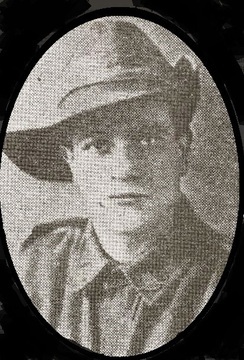NEWMAN, Joseph Lewin
| Service Number: | 1074 |
|---|---|
| Enlisted: | 19 March 1915 |
| Last Rank: | Private |
| Last Unit: | 17th Infantry Battalion |
| Born: | Brisbane, Queensland, Australia, 8 January 1897 |
| Home Town: | Balmain, Leichhardt, New South Wales |
| Schooling: | Not yet discovered |
| Occupation: | Miner |
| Died: | Concord Repatriation Hospital, New South Wales, Australia , 18 December 1979, aged 82 years, cause of death not yet discovered |
| Cemetery: |
Wagga Wagga Lawn Cemetery & Crematorium |
| Memorials: |
World War 1 Service
| 19 Mar 1915: | Enlisted AIF WW1, Private, 1074, 17th Infantry Battalion | |
|---|---|---|
| 12 May 1915: | Involvement Private, 1074, 17th Infantry Battalion, --- :embarkation_roll: roll_number: '12' embarkation_place: Sydney embarkation_ship: HMAT Themistocles embarkation_ship_number: A32 public_note: '' | |
| 12 May 1915: | Embarked Private, 1074, 17th Infantry Battalion, HMAT Themistocles, Sydney |
WW1
The details provided are taken from the book "Just Soldiers" written by WO1 Darryl Kelly, published 2004, chapter 26, pages 171-176. Joseph enlisted March 1915 at age 21 years. He was from Balmain NSW. Left Australia May 15, further training in Eqypt, and landed at Gallipoli 20 Aug 15. He was there only 3 weeks, and was struck down by illness, hospitalised 9 Sept and transferred to London in Oct to endure several months of treatment. Rejoined the 17th Infantry Battalion in France April 1916 and 3 weeks later he was again hospitalised with another illness. He again rejoined the 17th in Jan 1917. On 15th Apr 17 the 17th Battalion was in a pitched battle with the German Army, his platoon was surrounded and the survivors were captured, becoming prisoners of war. They were marched away from the battlefield, enduring barbaric treatment. The went into forced labour in factories and other businesses. They were stripped of their woollen uniforms and clothed in lightweight clothing. The weather they had to endure in that type of clothing was terrible, causing them all much distress. In Jan 1918 he was attached to a work party which included some Russian. Late one night, two of the Russians and Joseph escaped from the enemy and moving at night and resting by day they travelled 560 miles - 900 kms - before getting to Russia. They presented themselves to the authorities and were supplied with tickets on a river steamer to Vitepsk and a rail pass to Petrograd, then to see the British Consol. He gained passage on a ship to Canada, arriving 8 July 18, and soon on another ship to the UK arriving 8 Aug 18. After a hospital check up he was cleared for duty, but the armistice had been declared. He was on leave, eventually departing the UK for home in March 1919. He was awarded the Military Medal in April 1920 for the escape and the return to duty.
Submitted 25 February 2020 by Maxwell HILL









